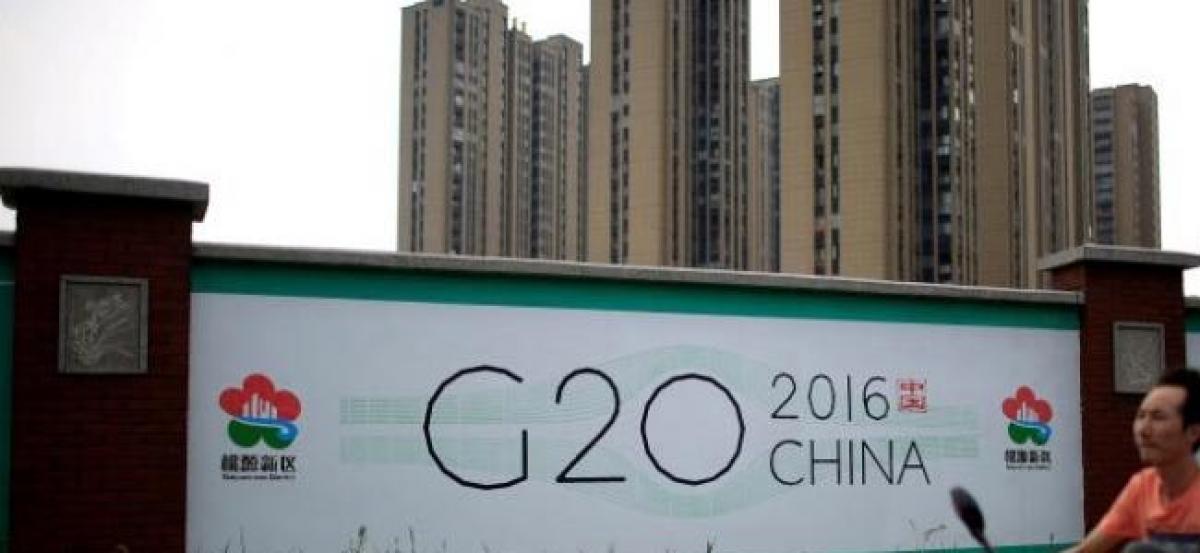Live
- International Men’s Day: Essential Wellness Products for Today’s Men
- Rajamouli, Prasanth Varma, others Praise 'Pushpa 2: The Rule' Trailer as 'Wildfire'
- Bandhan Life Expands National Footprint with Launch in Northern India
- Transforming Enterprises across Industry Verticals with Advanced Multi-Cloud Strategies and DevOps Solutions
- Is Your Food Safe? Understanding Labels, Packaging Claims, and Hidden Ingredients
- AAP replaces Kailash Gahlot with another Jat face in Delhi Cabinet
- Could Mars Have Hosted Life? How NASA’s Viking Missions May Have Missed It
- AAP govt settling Rohingyas in Delhi, giving voter cards: BJP
- CashKaro Founder Couple Swati & Rohan Bhargava Launch ‘BAD’ Podcast to Inspire India’s Next Generation of Dreamers
- Border-Gavaskar Trophy 2024-25: Australia’s assistant coach Daniel Vettori to miss first Test for IPL mega auction
Just In

Six U.S. senators have urged President Barack Obama to prioritize cyber crime at this weekend\'s Group of 20 summit in China, in the wake of the theft of $81 million from Bangladesh\'s central bank, according to a letter obtained by Reuters.
Six U.S. senators have urged President Barack Obama to prioritize cyber crime at this weekend's Group of 20 summit in China, in the wake of the theft of $81 million from Bangladesh's central bank, according to a letter obtained by Reuters.
In the letter sent to the White House ahead of the Sept. 4-5 summit, Sherrod Brown, a senior Democrat on the Senate Banking Committee, and five other Democratic senators say they want the U.S. president to press leaders from the world's 20 biggest economies to commit in joint communiques to a "coordinated strategy to combat cyber-crime at critical financial institutions."
The letter, dated Monday, suggests that concern among U.S. lawmakers is growing over the February incident in which hackers breached Bangladesh Bank's systems and used the SWIFT banking network to request nearly $1 billion from an account held at the Federal Reserve Bank of New York.
Some of the dozens of orders were filled, with much of the lost $81 million disappearing into Philippines casinos - prompting months of international finger-pointing, an ongoing investigation, and several requests from members of Congress for answers from the Fed and from SWIFT, the secure messaging service that banks use to transfer money around the world.
"Our financial institutions are connected in order to facilitate global commerce, but cyber criminals - whether independent or state-sponsored - imperil this international system in a way few threats have," the senators, headed by Gary Peters of Michigan, wrote in the letter to Obama.
"We strongly urge you to work with your counterparts and prioritize this discussion at the G20 leaders level in September," it said of the summit to be held in Hangzhou, China, adding that "executive leadership circles across the globe" needed to pay more attention to the risks.
A senator in the Philippines has said Chinese hackers were likely to have pulled off the Bangladesh Bank heist, citing a network of Chinese people involved in the routing of the stolen funds through Manila.
Beijing has dismissed the suggestion.
Copies of the letter from the U.S. senators were also sent to Federal Reserve Chair Janet Yellen and U.S. Treasury Secretary Jack Lew.
OBAMA-XI TALKS
The other senators signing the letter were Mark Warner and Martin Heinrich, both members of the Senate's Select Committee on Intelligence; Kirsten Gillibrand and Debbie Stabenow, the ranking Democrat on the Senate's Committee on Agriculture, Nutrition, and Forestry.
The White House expects G20 members at the summit "to affirm their commitment to cooperate to fight cybercrime and to enhance confidence and trust in the digital economy," a senior administration official said.
Asked generally about cyber security on Monday, White House spokesman Josh Earnest said at a press conference: "I would anticipate that this issue more generally will be on the agenda" when Obama meets Chinese President Xi Jinping, the G20 summit host, later this week.
At a November summit, the G20 pledged not to conduct economically motivated cyber espionage, an agreement intended to reduce the estimated hundreds of billions of dollars worth of commercial trade secrets that are stolen by foreign governments seeking to benefit industry in their own countries.
Since then, the Bangladesh Bank attack and others that have emerged are only some of the threats posed by cyber criminals, the senators wrote. World regulators should "erect more robust defenses and collaborative systems to prevent and mitigate the impact of successful attacks," the letter said, noting that steps already taken by SWIFT are not enough.
Bangladesh said it supported raising the issue at G20.
"In most cases, cyber attacks and crimes take place from outside the country," said Zunaid Ahmed Palak, a junior government minister for information and communications technology.
"So while addressing fast growing cyber attacks, there should be a coordinated approach involving global stakeholders."
The Fed and other U.S. regulators said in a letter last week they were focused on cyber risks and controls at banks in the wake of the Bangladesh incident, though they offered few specifics.
Peters, a member of the Senate's Committee on Homeland Security and Governmental Affairs, told Reuters he is considering requesting a committee hearing on the heist.
"I am concerned about the response and what steps have been taken to make sure it doesn't happen again," he said in an interview. "You just need more collaboration and sharing of information... because often times all these entities aren't talking to each other."
(This story has been refiled with full name of Bangladesh minister)

© 2024 Hyderabad Media House Limited/The Hans India. All rights reserved. Powered by hocalwire.com







